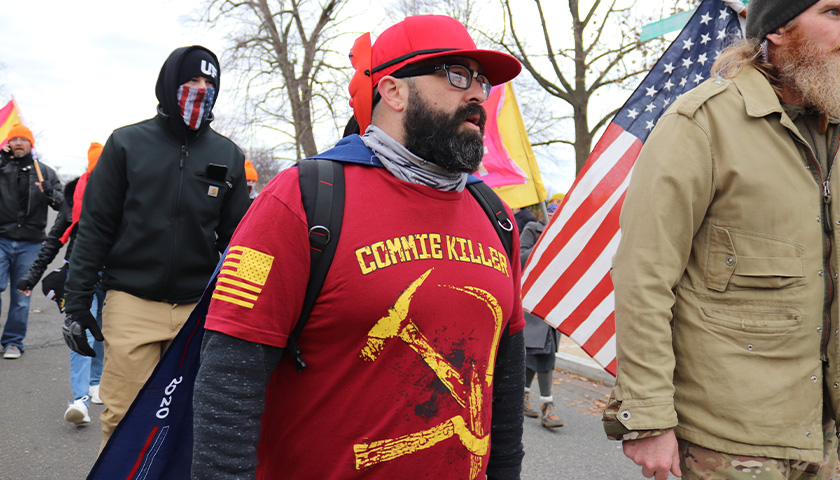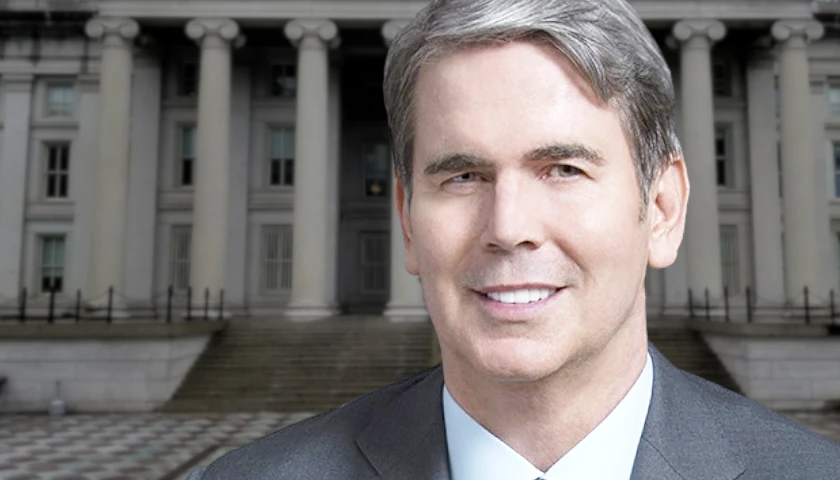by Julie Kelly
One year after the events of January 6—despite their best efforts—federal prosecutors still hadn’t filed a single criminal charge that came anything close to resembling “insurrection” or domestic terrorism. Democrats and regime media were agitated: How could they continue promoting the four-hour disturbance as an attempted coup if the most prevalent offense charged by the Department of Justice a year later was the petty misdemeanor of “parading” in the Capitol? Even the chief judge for the D.C. district court overseeing each January 6 case had publicly expressed her frustration that the government wasn’t producing harsher indictments against Trump supporters.
So Matthew Graves, the U.S. Attorney for the District of Columbia, swooped in to save face. Eleven members of the Oath Keepers, an alleged militia group, were charged on January 12, 2022 with seditious conspiracy for their involvement in the Capitol protest. Elmer “Stewart” Rhodes and 10 others were accused of conspiring “to oppose by force the authority of the Government of the United States, and by force to prevent, hinder, or delay the execution of any law of the United States.” The law the Oath Keepers attempted to stop, Graves claimed, was the “peaceful transfer of power” vested in both the 12th and 20th amendments.
The indictment was preposterous on its face, something only a grand jury seated in the most Democratic city in the country could countenance. None faced a weapons charge, raising the natural question of how a group of military veterans, most suffering various degrees of service-related disabilities, planned to overtake the government “by force” without a single firearm or explosive device. Despite constant talk in the media about the Oath Keepers’ quick reaction force, individuals who brought weapons with them on the drive to Washington left them behind in a Virginia hotel—legally—so as to not violate the city’s strict gun control laws.
Some militia.
Only one man, Joshua James, was accused of assaulting police in a heated confrontation with officers that afternoon. (He later pleaded guilty to seditious conspiracy after the government moved to take away his military benefits—James was nearly killed by a roadside bomb in Bagdad in 2007 at age 19, suffers lifelong injuries, and was awarded a Purple Heart—and threatened the father of three young children with life in prison if convicted.)
Two groups of Oath Keepers, described as “stacks” by prosecutors, entered the Capitol about 30 minutes after the building had been evacuated; the first group walked through doors that were opened from the inside on the east side. The second group entered shortly after 3 p.m. and exited a short time later.
Over a seven-week trial for the first five defendants, which started in September, prosecutors presented evidence of inflammatory chats featuring military-style bravado and condemnations of a stolen presidential election. Jurors watched a repetitive loop of videos showing three of the defendants entering the Capitol as well as screenshots of selfies taken inside the Rotunda. Jessica Watkins, a transgender Oath Keepers member from Ohio, was heard on an encrypted audio channel bragging about “sticking to the plan” before she and others entered the building. But far from acting as “insurrectionists” or terrorists, Oath Keepers viewed themselves as “backups” for law enforcement, available in case Antifa or Black Lives Matter rioters caused trouble as they had for months in Washington during the second half of 2020.
And witness after witness, including those for the government, admitted the defendants did not plan in advance to “storm” the Capitol. No matter—prosecutors argued that the accused could have entered into the “conspiracy” at any time, including moments before they walked inside the Capitol, and that the agreement didn’t require any specificity or overt consent. “The government also does not have to prove that all members of the conspiracy directly met, or discussed between themselves their unlawful objectives, or agreed to all the details, or agreed to what the means were by which the objectives would be accomplished,” the final jury instructions read. “What the government must prove beyond a reasonable doubt is that two or more persons in some way or manner arrived at some type of agreement, mutual understanding, or meeting of the minds to try to accomplish a common and unlawful objective.”
Jurors did not hear, however, from numerous FBI informants including the group’s vice president, who suffered a medical emergency as he boarded a plane for D.C. to testify. Judge Amit Mehta also refused to allow the jury to hear expert testimony and evidence of “agents provocateurs” located outside the east side of the building near the Oath Keepers yet remain unidentified and uncharged to this day.
Defense witnesses who saw the defendants act as a barrier between unruly protesters and law enforcement, including Capitol Police Officer Harry Dunn who took the stand for the prosecution during the trial, were prevented from testifying.
But the vagueness of the law’s language, the piecemeal body of evidence, and Judge Mehta’s obvious preference for the government’s case teed up the inevitable outcome: two men, Rhodes, who never went inside the Capitol on January 6, and Kelly Meggs, were found guilty of seditious conspiracy, the first Americans ever convicted of the exceptionally rare crime. (The last time the Justice Department brought seditious conspiracy charges against U.S. citizens in 2010, a federal judge tossed the case out of court.) Three others were acquitted of the charge. All five were found guilty of obstruction of an official proceeding, a post-Enron statute intended to prevent tampering with evidence during a congressional investigation not interrupting a government function.
The verdicts, cheered by the media and the regime, will serve as an accelerant in the Justice Department’s bastardization of arcane (seditious conspiracy) and inapplicable (obstruction of an official proceeding) laws to criminalize political dissent in the wake of January 6. An act of sedition no longer requires proof of an elaborate plan engineered months if not years in advance, the use of heavy weaponry, and attempts to injure or kill lawmakers or law enforcement officials to take over government functions. All it requires is some heated rhetoric on social media or in private group chats coupled with a nonviolent entry into a public building.
“The most punishing aspect of the Kelly Meggs conviction is the fact he walked through an open door with no resistance from law enforcement and stayed inside the Capitol for 17 minutes where he led a prayer with other Oath Keepers in the Rotunda,” investigative journalist Steve Baker, who covered each day of the trial, told American Greatness on Thursday. “Then he walked to the stairwell where he diffused a potentially disastrous situation with Officer Dunn.” (Dunn, carrying an M-4 rifle, also had to be calmed down by a supervisor that afternoon.)
“Ninety percent of the government’s case relied on scary words, and Kelly Meggs definitely had some scary words,” Baker said. “But now he faces up to 86 years in prison.”
Baker said prosecutors had “all the resources to present this slick, fast, audio visual of interspersing slides and recordings taken out of context” to persuade the jury. But looking at the mixed verdicts of guilty and not guilty, Baker said, “makes no sense.”
It makes sense, of course, in terms of bolstering the phony, empty narrative that Trump supporters are domestic terrorists and that January 6 was a near-coup incited by the former president. Justice Department officials took turns commending themselves for a job well done. “As this case shows, breaking the law in an attempt to undermine the functioning of American democracy will not be tolerated,” FBI Director Christopher Wray said in a press release issued shortly after the verdicts were read. “The FBI will always uphold the rights of all citizens who peacefully engage in First Amendment protected activities, but we and our partners will continue to hold accountable those who engaged in illegal acts regarding the January 6, 2021, siege on the U.S. Capitol.”
Laughably referring to the jury as “impartial,” a near-impossibility in a city that voted 93 percent for Joe Biden in 2020, Graves claimed the result ”reaffirms the strength of our democracy and the institutions that protect and preserve it, including our criminal justice system.”
Steven D’Antuono, head of the Detroit FBI field office during the Whitmer fednapping hoax and retiring head of the Washington FBI field office, bragged that “this case shows that force and violence are no match for our country’s justice system.”
Force and violence? Show your work, Mr. D’Antuono.
Not to be outdone in the hyperbole department, the January 6 select committee also claimed victory, immediately tying the verdicts to Trump. “The Select Committee’s investigation demonstrated that when Donald Trump summoned a mob to assemble in Washington, DC on January 6th, the Oath Keepers and other extremist groups heard that call and began to plan and coordinate,” Representatives Bennie Thompson (D-Miss.) and Liz Cheney (R-Wyo.) said in a statement. “It’s vital that there be accountability for every vile aspect of January 6th and the events that led to that day’s tragedy.”
The real tragedy isn’t what happened on January 6 but the retaliatory, inhumane, and destructive way the Biden regime and Congress have handled the matter ever since. New ground is set with every egregious indictment and conviction with dire consequences for the future of political speech and activity. As bad as it looks now, the worst is yet to come.
– – –
Julie Kelly is a political commentator and senior contributor to American Greatness. She is the author of January 6: How Democrats Used the Capitol Protest to Launch a War on Terror Against the Political Right and Disloyal Opposition: How the NeverTrump Right Tried―And Failed―To Take Down the President. Her past work can be found at The Federalist and National Review. She also has been featured in the Wall Street Journal, The Hill, Chicago Tribune, Forbes, and Genetic Literacy Project. She is the co-host of the “Happy Hour Podcast with Julie and Liz.” She is a graduate of Eastern Illinois University and lives in suburban Chicago with her husband and two daughters.
Photo “Proud Boys” by Elvert Barnes. CC BY-SA 2.0.




